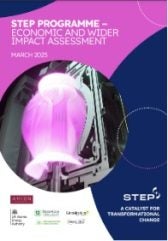
A report commissioned by Nottinghamshire County Council, STEP Programme – Economic and Wider Impact Assessment outlines predicted economic benefits of the UK Atomic Energy Authority’s (UKAEA’s) Spherical Tokamak for Energy Production (STEP) project. The prototype fusion energy power plant is to be built at the site of the West Burton coal-fired power plant in Nottinghamshire. landscape. The STEP programme is intended to be the first prototype fusion energy plant in the world when operational in the 2040s.
STEP is intended to deliver predictable net electricity greater than 100 MW; to exploit fusion energy beyond electricity production; to ensure tritium self-sufficiency; to qualify materials and components under appropriate fusion conditions; and to develop a viable path to affordable lifecycle costs. The STEP fusion facility will also support a skills centre and a business park.
The 12-page report by economic and finance specialists Amion Consulting, covers a period of more than 45 years, from the start of planning in 2019 to 2065. Most of the benefits are not expected before 2030. Nottinghamshire County Council, working closely with UK Industrial Fusion Solutions (UKIFS), a wholly-owned subsidiary of UKAEA. commissioned the report on behalf of key partners, including Bassetlaw District Council, Lincolnshire County Council and West Lindsey District Council.
According to the economic model developed to predict the key economic benefits of STEP, they include jobs linked directly to the project and lucrative contracts for local and national supply chains. The model also takes into account the wider benefits to the local economy such as more disposable income for local residents resulting from better-paid jobs.
The report forecasts an annual average of more than 1,000 new construction related jobs that will boost the Nottinghamshire economy by £86m ($111m) a year. The number of operational jobs is predicted to be around 2,760 each year, which will boost the economy annually by £210m.
For the East Midlands region, an average of 2,976 construction, planning and design-related jobs are expected to be created each year, boosting the regional economy each year by an average £236m. An average of 6,440 new operational jobs are expected to boost the East Midland’s economy by around £489m a year.
As well as the directly related economic impacts, the STEP programme is also forecast to generate substantial wider impacts including:
- Labour, Skills and Training Induced development
- Development, Investment and Housing Commercial development
- Knowledge/Technology Transfer
- Productivity – the new jobs are in sectors that have higher productivity than the national average
- Non-monetised impacts in terms of the environment, pride of place, regeneration, accessibility/transport, image, and soft power/ international relations.
“This is the first examination of the positive economic impacts of the STEP programme across the region and beyond,” said UKIFS CEO Paul Methven. “It gives a fascinating insight into the potential for STEP to deliver direct economic and social benefits and stimulate much wider opportunities across many sectors. We look forward to supporting regional leaders in driving these opportunities regionally and enabling economic growth nationally.”
Keith Girling, Nottinghamshire County Council’s Cabinet Member for Economic Development and Asset Management, said: “This is incredible news for our county and the region, particularly for our future generations who will really reap the benefits. This report now provides us with crucial insight and sets a benchmark to help partners plan for future investment as well as environmental and economic policies in that area.”






